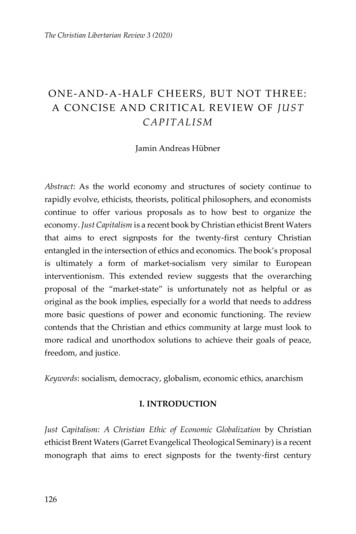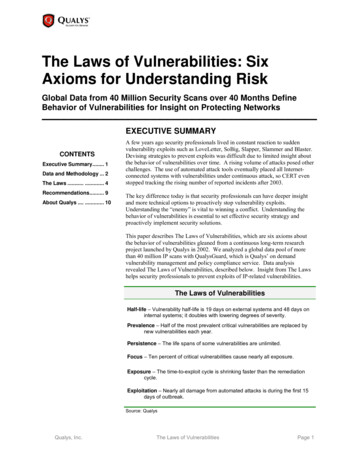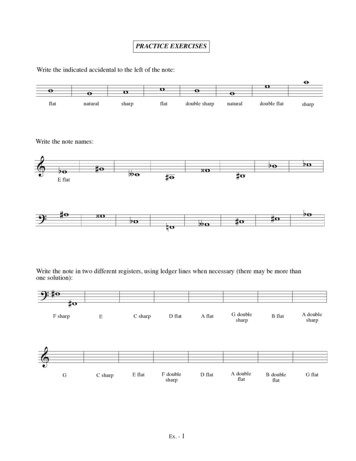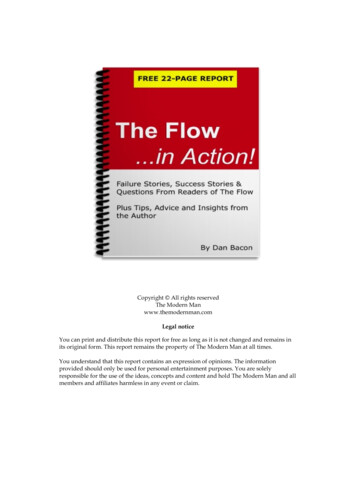
Transcription
The Christian Libertarian Review 3 (2020)O N E - A N D - A - H A LF C H E E R S , B U T NO T T H R E E :A C O NC I S E A N D C R I T I C A L R E V I EW O F J U S TCAPITALISMJamin Andreas HübnerAbstract: As the world economy and structures of society continue torapidly evolve, ethicists, theorists, political philosophers, and economistscontinue to offer various proposals as to how best to organize theeconomy. Just Capitalism is a recent book by Christian ethicist Brent Watersthat aims to erect signposts for the twenty-first century Christianentangled in the intersection of ethics and economics. The book’s proposalis ultimately a form of market-socialism very similar to Europeaninterventionism. This extended review suggests that the overarchingproposal of the “market-state” is unfortunately not as helpful or asoriginal as the book implies, especially for a world that needs to addressmore basic questions of power and economic functioning. The reviewcontends that the Christian and ethics community at large must look tomore radical and unorthodox solutions to achieve their goals of peace,freedom, and justice.Keywords: socialism, democracy, globalism, economic ethics, anarchismI. INTRODUCTIONJust Capitalism: A Christian Ethic of Economic Globalization by Christianethicist Brent Waters (Garret Evangelical Theological Seminary) is a recentmonograph that aims to erect signposts for the twenty-first century126
“One-and-a-Half Cheers, But Not Three” (Hübner)Christian entangled in the intersection of ethics and economics. 1 It is thelatest in the growing subgenre of books on these topics and“globalization.”2 The basic thesis of the book is that global capitalism canbe affirmed for the good things that it does, but is inadequate to addressall of society’s needs.3I explain in [great] detail why Christians can give economic globalizationtwo-and-a-half cheers, but not three. (p. 15)This forms the basic structure of the book—“Sustaining Human Life: WhyExchange Is Necessary” (Part 1) and “ but Not Sufficient: EnablingHuman Flourishing” (Part 2). As such, the overall tenor is one of continualdichotomies, dualisms, and “yes—but” propositions, establishing a feel(and, as I’ll argue, veneer) of balance and modesty.As one reads through Just Capitalism, it becomes clear that the book ismuch more than an ethical reflection on global economy or a critique ofneoliberalism, neoconservatism, and Western consumerism. It offersrelatively concrete proposals beyond theory. Most notably, it forcefullyargues that deficiencies in “the market” (or “capitalism”) is a license fortraditional political coercion. Washington D.C. may have its problems, but1Brent Waters, Just Capitalism: A Christian Ethic of Economic Globalization (Louisville:Westminster John Knox Press, 2016). Short in-text references of page numbers will be usedfor this extended review.2E.g., Max Stackhouse, Peter Berger, M. Douglas Meeks, eds., Christian Social Ethics in a GlobalEra (Nashville: Abingdon Press, 1995); Peter Heslam, Globalization: Unraveling the NewCapitalism (Cambridge, UK: Grove Books, 2002); Douglas Hicks, ed., Global Neighbors:Christian Faith and Moral Obligation in Today’s Economy (Grand Rapids: Eerdmans, 2008); PeterHeslam, ed. Globalization and the Good (Grand Rapids: Eerdmans, 2004); Bob Goudzwaar andHarry de Lange, eds. Beyond Poverty and Affluence: Toward and Economy of Care (WashingtonD.C.: World Council of Churches, Ethics and Public Policy Center, 1994). Related booksinclude such works as Rebecca Blank and William McGurn, Is the Market Moral?: A Dialogueon Religion, Economics and Justice (Washington D.C.: Brookings Institution, 2003) and DanielFinn, Christian Economic Ethics (Minneapolis: Fortress Press, 2013), among many others.3I suspect there is wide and growing agreement of this general sentiment; I certainly concur.127
The Christian Libertarian Review 3 (2020)it is the completing half to an otherwise incomplete and dysfunctionalsociety. This rather anodyne and (in this reviewer’s view) problematicconclusion seems to undermine instead of support many of the book’sown legitimate goals and observations.II. SITUATING THE BOOK’S FRAMEWORKOn the ethical dimension, Just Capitalism functions more or less asversion 2.0 of John Rawl’s Theory of Justice,4 with its economic and socialmodel roughly aligned with other Christian thinkers like James Skillen, 5Jim Wallis,6 Ron Sider,7 Charles Gutenson,8 Tony Campolo,9 and to a lesserdegree, Lew Daly,10 Kees van Kersbergen,11 John Milbank,12 Joerg Reiger,134John Rawls, A Theory of Justice (Cambridge: Harvard University Press, 1971).5James Skillen, The Pursuit of Justice: Christian Democratic Explorations (Lanham: Rowman andLittlefield, 2004).6Jim Wallis, Justice for the Poor: Participant’s Guide (Grand Rapids: Zondervan, 2010).Ronald Sider, Rich Christians in an Age of Hunger: Moving from Affluence to Generosity7(Nashville: Thomas Nelson, 2015, orig. 1978); idem., Just Generosity (Grand Rapids: BakerBooks, 2007).8Charles Gutenson, Christianity and the Common Good (Grand Rapids: Brazos Press, 2011).9Tony Campolo, Red Letter Christians (Ventura: Regal, 2008) and Was Jesus a Republican orDemocrat? (Nashville: Thomas Nelson, 1995).10Lew Daly, God’s Economy: Faith-Based Initiatives and the Caring State (Chicago: ChicagoUniversity Press).11Kees van Kersbergen, Social Capitalism: A Study of Christian Democracy and the Welfare State(London: Routledge, 1995).12John Milbank, “Can the Market be Moral? Peace and Prosperity Depends on a ReimaginedSocialism,” ABC Religion and Ethics (October 24, 2014) and The Future of Love: Essays in PoliticalTheology (Eugene: Cascade, 2009).13Joerg Rieger, No Rising Tide: Theology, Economics, and the Future (Minneapolis: FortressPress, 2009).128
“One-and-a-Half Cheers, But Not Three” (Hübner)Luke Bretherton,14 Max Stackhouse,15 Douglas Meeks,16 Cornell West,17Richard Horsley,18 Daniel Finn,19 and Gary Dorrien.20 This model is bestdescribed as (“Christian”) communitarian democratic socialism (or“market-socialism”),21 though all of these terms are strategically-avoidedwithin the book.22Besides an affirmation of voluntary associations and traditional socialinstitutions (family, business, etc.), of virtue, and a critique ofconsumerism and the neoliberalism behind it, the proposed modeltherefore amounts to a central, democratic state that undertakes14Luke Bretherton, Resurrecting Democracy (Lanham: Cambridge University Press, December2014).15Max Stackhouse, Peter Berger, Dennis McCann, and M. Douglas Meeks, Christian SocialEthics in a Global Era (Nashville: Abingdon, 1995).16Douglas Meeks, God the Economist: The Doctrine of God and Political Economy (Minneapolis:Fortres Press, 1989).17Cornel West, Democracy Matters: Winning the Fight Against Imperialism (New York: Penguin,2005); The Ethical Dimensions of Marxist Thought (New York: Monthly Review Press, 1991).18Richard Horsley, Covenant Economics: A Biblical Vision of Justice for All (Louisville: WJK,2009).1920Finn, Christian Economic Ethics.Gary Dorrien, Social Democracy in the Making: Political and Religious Roots of EuropeanSocialism (New Haven: Yale University Press, 2019). Being more Marxist, Rieger, West, andHorsley are much more critical of markets and capitalism than Waters et. al. Horsley’s bookhas a bit different focus than the aforementioned volumes, being focused on the economiccontext of the Old and New Testament. Milbank’s “Christian socialism” and Dorrien’s vieware a bit more nuanced. The same for Daly and Kersbergen, which sees Germany andHolland as a successful embodiment of Kuyper’s “sphere sovereignty” and the Catholicprinciple of “subsidiarity.” Finally, Finn’s views represent Catholic social thought, which are(in my view) conducive to democratic socialism, though this remains a bitter debate withinRoman Catholic quarters.21See Dic Lo and Russell Smyth, “Towards a Re-Interpretation of the Economics of FeasibleSocialism,” Cambridge Journal of Economics 28:6 (2004): 791-808, where “market socialism” isone of four types of socialism.22Rawls, Milbank, Dorrien, West, Rieger, Daly, and Bell are more forthright (and perhapshonest) by using “socialism” explicitly. However, given the sheer variety of socialisms andconnotations, Waters’ choice to avoid the term “socialist/ism” in Just Capitalism isunderstandable.129
The Christian Libertarian Review 3 (2020)“redistributing wealth and income” on behalf of “society” (pp. 199-201),subsidizes “state-sponsored social capital” and education (p. 180),energy (p. 125), food (p. 125), enforces progressive taxation (p. 199) andregulations (e.g., building codes, workplace safety, etc., p. 172), ensures atheoretical economic minimum for all persons (pp. 179-180), and anythingelse that promotes the generic goal of “human flourishing.” 23 Many ormost prices in the economy are determined by supply and demand, butmarkets are entirely overseen (and sometimes directly manipulated) bythe political apparatus. Property-rights exist but are subordinate to thestate since the state is more capable of establishing genuine social justicethan “the market.”The “communitarian” dimension, which has its roots in themovement of the early 1990s,24 is also evident. Communitarianismsignificantly overlaps democratic socialism, emphasizing the family(workplaces should provide parental leave, benefits, etc. to that end), 25reciprocity between people/families and the community,26 participation inbroader communal life so people can flourish, 27 a “social minimum ofnurture,”28 and “a more robust view of equal opportunity,” 29 meaning23Cf. “common good.” Unlike Gutenson, Wallis, Sider, Rieger, Finn, and many others,Waters does not appear to support wage controls.24See The Responsive Community journal (debuted in 1990), the “Responsive CommunitarianPlatform” (1991, https://communitariannetwork.org/platform), and Amitai Etzioni, ed. TheEssential Communitarian Reader (Lanham: Rowman and Littlefield, 1998).25“The Responsive Communitarian Platform,” xxvii.26Ibid., xxi-xxiv.27Philip Selznik, in Responsive Community (1996) cited in Ashley Woodiwiss, “ChristianEconomic Justice and the Impasse in Political Theory,” 128-29.28Ibid.29Ibid.130
“One-and-a-Half Cheers, But Not Three” (Hübner)community investment in “jobs, education, and opportunities forservice.”30 These themes form the backbone of Just Capitalism.31Similarly, Waters’ proposal significantly overlaps Catholic socialthought. One reads from the 1986 National Conference of Catholic Bishopsthat “All people have a right to participate in the economic life of society.Basic justice demands that people be assured a minimum level ofparticipation in the economy As Pope John XXIII declared, ‘all peoplehave a right to life, food, clothing, shelter, rest, medical care, education,and employment.’”32 This framework is essentially the same as the 1919Catholic bishops’ “Program of Social Reconstruction.” 33 Along the samelines, Finn argues in his Christian Economic Ethics that “The needs of allmust be met,” that reciprocity (in contrast to contractual exchange andgifting) is essential, that the community through democracy should“provide protection for all of the unemployed,” and that coercion is notconcerning as long as it is “exercised with justice and prudence, servingthe common good.”34 Finn also opposes “libertarianism” as extreme and a30Ibid.31On the importance of family, see Just Capitalism, 37-38, 73-77, 115-16, 127, 145-147; onreciprocity, 103, 107, 111-113, 140, 145-149, 156-57, 164; on enabling participation in a globalcommunity, x, xi, 2, 8, 124, 170-71; on the “social minimum” or “safety net,” 128, 145, 148-49,170-80; on equal opportunity, 25, 76, 128, 139, 141, 191; on importance of social capital, 26-35,61-66,102-107, 157-158, 175-176, 193-96.32Cited in Stackhouse et. al., Christian Social Ethics, 111.33The program “contained a set of immediate reforms, including the establishment of a legalminimum wage, public housing for workers, labor participation industrial management, andsocial insurance for illness, disability, unemployment, and old age, funded by a levy onindustry .worker ownership of capital, universal living wages, and abolition and control ofmonopolies.” Daly, God’s Economy, xi.34Finn, Christian Economic Ethics, 340-42; 360-62.131
The Christian Libertarian Review 3 (2020)distraction.35 Again, most of these sentiments are explicit and integral toJust Capitalism.36Just Capitalism’s proposal of the “market-state” is ramodifiedAmericaninterventionism. It creates the closest approximation to a social ideal byjoining the wealth-producing abilities of the market and the justicecreating abilities of the state (73). In this arrangement, the driving ethic isconsequentialism (i.e. “the ends justifies the means”); in Waters’ words,“recourse to coercion may be required to establish just conditions” (188).And by “coercion” in statements such as these, Waters means not merelyresponsive force (i.e., capturing criminals), but the initiation of forceagainst a person or their property in the name of a social good: “It is justto require people to share, to a limited extent, the risks and benefits ofcompetitive global markets” (p. 191, emphasis mine). In short, the “state”side of Waters’ “market-state” is more of a nanny or parent (thattheoretically cooperates with her children) than a referee or umpire thatoperates as a neutral, third-party.On the one hand, then, this nanny-state is synonymous withcontemporary democratic socialist proposals (though the degree ofpolitical involvement may vary). On the other hand, it contrasts toChristian, anarchist, and Marxist socialisms, which are typically anarchist35Nathaniel Finn, “Nine Libertarian Heresies Tempting Neoconservative Catholics to Strayfrom Catholic Social Thought,” Journal of Markets and Morality 14:2 (2001): 487-503. Contrastwith Thomas E. Woods, The Church and the Market: A Catholic Defense of the Free Economy(Lanham: Lexington Books, 2015; orig. 2005).36Waters’ ideology also seems to reflect the conflicted Burkean Republicanism of TheodoreRoosevelt: “Paradoxically, [Roosevelt’s] Burkean, republican commitment to restrainingmen’s worst passions merged with his evolutionist affirmation of the corporate order ofunbridled enthusiasm for expanding state power to push him in 1907 and 1908 along a pathof reform both distinct from the insurgents and distinctly unconservative .[He proposed]the use the federal government to direct the corporate economy’s evolution and stimulate aunifying surge of national feeling.” Joshua David Hawley, Theodore Roosevelt: Preacher ofRighteousness (New Haven: Yale University Press, 2008), 170. Cf. Waters, Just Capitalism, 154160.132
“One-and-a-Half Cheers, But Not Three” (Hübner)(anti-state) and stress the necessity for cooperative (i.e., “employeeowned”) business in a voluntarist society that values social justice. Thenanny-state of democratic socialism also contrasts with minarchistlibertarianism, which grants the legitimacy of the state but typicallyrestricts its role to courts (contract enforcement), police (law enforcement),and military (national defense).This democratic-socialist/“nanny-state” identity becomes moreevident when Just Capitalism is situated within the larger conversationabout globalization (of which there are endless new monographs beingwritten).37 Here, Waters is anything but alone in expressing concern andsearching for better options. This is also true among Christian thinkers.For example:1.Max Stackhouse of Princeton “hopes for a modified, democraticsocialism.”382.Daniel Bell, formerly of Lutheran Theological Southern Seminary,calls for a Christian “socialism.”393.Gary Dorrien of Union Theological Seminary advocates “socialdemocracy.”404.John Milbank of University of Nottingham advocates “Christiansocialism” and “a new paradoxical infusion” of democracy and“parentalism.”4137Four notable volumes on this general topic include Branko Milanovik, Global Inequality: ANew Approach for the Age of Globalization (Cambridge: Belknap, 2018); Jeffrey Frieden, GlobalCapitalism: Its Fall and Rise in the Twentieth Century (New York: W. W. Norton, 2006); TorbenIverson and David Soskice, Democracy and Prosperity: Reinventing Capitalism through aTurbulent Century (Princeton: Princeton University Press, 2019); Thomas Picketty, Capital inthe Twenty-First Century, trans. Arthur Goldhammer (Cambridge: Belknap Press, 2014).38Stackhouse, Christian Social Ethics, 14.39Daniel Bell, The Economy of Desire: Christianity and Capitalism in a Postmodern World (GrandRapids: Baker Academic, 2012); cf. Daniel Bell, The Cultural Contradictions Of Capitalism: 20thAnniversary Edition (New York: Basic Books, 1996, orig. 1976).40Dorrien, Social Democracy in the Making.41Milbank, The Future of Love.133
The Christian Libertarian Review 3 (2020)5.Lew Daly of Dēmos advocates a “Christian democracy”42 andKees van Kersbergen of Aarhus University “Social Capitalism,” 43as embodied in modern Germany and Holland.6.Luke Bretherton of Duke University, calls on others to embrace ationaldemocracy” which is also interfaith-supporting).447.Philip Clayton at Claremont advocates “organic Marxism.” 458.Daniel Finn of Saint John’s University is one of many advocatesof “Catholic social thought,” which “rests on the threefoldcornerstones of human dignity, solidarity and subsidiarity” (JohnPaul II).46And then there is Brent Waters in Just Capitalism, advocating the “marketstate,” which is, as many others concur, a “family affair” of governmentand economic justice.47We should note for the sake of contemporary debate that all of theaforementioned proposals share several key features. First, they sharesome of the same goals and complaints (e.g., we must deal with socialinequities, consumerism, poverty problems, greed, concentrations of42Daly, God’s Economy.43Van Kersbergen, Social Capitalism.44Luke Bretherton, Resurrecting Democracy (Lanham: Cambridge University Press, December2014). Bretherton, like his fellow Christian ethicists Waters and Milbank, proposes legislationthat generally presume the political apparatus as society’s competent nanny.45Philip Clayton and Justin Heinzekehr, Organic Marxism: An Alternative to Capitalism andEcological Catastrophe (Claremont: Process Century Press, 2014).46Amidst all these, also note Cornell West’s “democratic socialism.”47See Stephen Mott and Ron Sider, “Biblical Justice,” in David Gushee, ed., Toward a Just andCaring Society (Grand Rapids: Baker, 1999), 43. Cf. 394, 498.We might also mention others, such as the “front-porchers.” See Mark Mitchell and JasonPeters, Localism in the Mass Age: A Front Porch Political Manifesto (eugene: Wipf and Stock,2018). Cf. Bruce Katz and Jeremy Nowak, The New Localism: How Cities Can Thrive in the Ageof Populism (Washington D.C.: Brookings Institution Press, 2018), which points towards citiesinstead of the rural landscape as the site of renewal.134
“One-and-a-Half Cheers, But Not Three” (Hübner)power and wealth, neoliberalism, 48 reductionist neoclassical economics,corporate control of government, etc.). Second, most share many of thesame solutions (e.g., legislation, top-down regulation, redistribution ofcapital, more private integration with political apparatus, less secularism,more communal focus). Third, none seriously question the legitimacy ofpolitical authority or the modern-day nation-state (i.e., the crown,whether in the form of democracy, monarchy, or otherwise, is viewed asa “natural,” or at least permanent, fixed institution of society) or itsfunctionality (i.e., the state is able to effectively act as a “neutral” or“disinterested” party); only those like anarchists, Marxists, democraticconfederalists, anarcho-capitalists, and anarcho-socialists question the48Garrett Brown, Iain McLean, Alistair McMillan, The Concise Oxford Dictionary of Politics andInternational Relations (Oxford Quick Reference), 4th ed. (New York: Oxford University Press,2018), 368: “Here [neoliberal] is often linked to the so-called ‘Washington Consensus’(privatization and deregulation; trade and financial liberalization; shrinking the role of thestate; encouraging foreign direct investment) and to the structural adjustment programmespromoted by the IMF and World Bank. More recently, it has been used (for example, by theanti-globalization movement) to characterize the economic ideology behind capitalistglobalization. Whilst all of these usages are related, the economic use of the termneoliberalism is somewhat general and imprecise.” Cf. Letitia Campbell and YvonneZimmerman, “Christian Ethics and Human Trafficking Activism,” in Sex and Gender:Christian Ethical Perspectives, ed. (Washington D.C.: Georgetown University Press, 2018), 191;Rieger, No Rising Tide, 12-13; Bell, Economy of Desire, 24: “’neoliberalism’ has since becomea common way of referring to the neoclassical vision of capitalism associated with theUniversity of Chicago and especially Friedrich von Hayek and Milton Friedman. Politically,it is associated with the economic agendas of Ronald Reagan and Margaret Thatcher, as wellas Bill Clinton and Tony Blair. At its most general level, neoliberal capitalism is about thecomplete marketization of life. In particular, it is about overcoming the obstacles to andinefficiencies introduced into the market by the Keynesian or welfare-state economics of theprevious generation and increasing the integration of the entire globe into the capitalistmarket. Although it is frequently cast as ‘antigovernment’ by both its advocates andproponents, it is in fact fond of a lean, strong state that is ‘small’ with regard to its interferencein market processes while nevertheless retaining and even enhancing its strength for the sakeof security, particularly in the face of threats to the market.”135
The Christian Libertarian Review 3 (2020)authority of the state.49 Fourth, all address the intersection of Christianthought with economics, but noticeably few (with the exception of Finn)are writing as thinkers who are actually theologians/biblical scholars andeconomists.In the end, then, despite some differences, these proposals aregenerally different versions of the same political and economicphilosophy: “democratic-socialism” or “market-socialism.” All of this isto say that, while potentially useful in some contexts and well organizedand written, Just Capitalism remains unoriginal.50III. ANALYSIS AND REFLECTIONAs a theologian and economics professor, I generally enjoyed readingJust Capitalism and its attempt at solving popular problems in thisintersection of disciplines. But, upon reaching the second half of the book,I felt somewhat tricked. The author used economic jargon in the first halfin a way that showed some familiarity with basic free-market concepts.However, it became clear that a genuine understanding was lacking uponreaching the second half, when many of the principles in the first half weredefenestrated in the same manner as popular pundits, and with the samekind of unoriginal solutions. (Hence my earlier remark about a surfacelevel “veneer.”)More substantial are the internal problems of the book’s majorproposals. The “market-state,” to use the author’s words, is supposed tocombine the “best of both worlds”—the coercive, order-making functionof the state and the wealth-producing abilities of capitalism. However,49Cf. Michael Huemer, The Problem of Political Authority: An Examination of the Right toCoerce and the Duty to Obey (New York: Palgrave Mcmillan, 2012).50This would not be a critique were it not for the almost entire lack of references to theaforementioned literature. Indeed, Just Capitalism communicates little to the audience that itis the continuation of arguments and sustained dialog within a particular ideologicalfamily. This tends to give readers a false impression about the originality of the “marketstate” and other theses.136
“One-and-a-Half Cheers, But Not Three” (Hübner)even if one grants this, the author does not appear aware of how marketsocialism is (also) known to produce the worst of both worlds. All of theweaknesses of both politics and profit-making are present—if notcompounded.For example, early Marxist, socialist and anarchist critiques ofcapitalism (e.g., it’s exploitation of the working class, putting profit overpeople, the dangers of radical inequalities and centralizations of wealth,etc.),51 are largely unaddressed. In fact, Waters talks about the privatesector as “geese laying golden eggs” (p. 192), systematically and faithfullyexploited not by bourgeois employers (as in Marx), but by the statethrough taxation.Similarly, the problems of crony-capitalism are thrown a bone (p. 124),but not seriously addressed. This is perhaps the most disconcerting aspectof the book because the market-state is the ideal environment for cronyism togrow: “cooperation” between the state and producers is encouraged andexpected. The average citizen might voice their condemnation against theinfluences of war factories, Google, Amazon, and Big Pharma on thegovernment, but the model of Just Capitalism practically requires that thiskind of corruption and influence continue. It does no good to simply say“well only the good kind of cooperation between corporations and the statewill occur.” There is no clear mechanism or concrete proposal for how thisnotorious problem will be effectively circumvented.There is also the elephant-in-the-room of central banking. Readersmight ask, for instance: How can any ethicist today reasonably justify aprivate bank maintaining a total monopoly over the credit and monetarysystem—especially given the catastrophic hazards that this has created in(for example) the Great Depression, Great Recession, and bailouts andmonetary policy of early 2020 under Trump? Or justify a central bank’s51See the first half of E. K. Hunt and Mark Lautzenheiser, History of Economic Thought: ACritical Perspective, 3rd ed. (London: Routledge, 2011) and “Utopians and Socialists” on TheInstitute for New Economic Thinking’s The History of Economic Thought pia.htm137
The Christian Libertarian Review 3 (2020)ownership of over half the private equity market—as it currently standsfor Japan? Is it justice for the poor to have to pay more and more for thesame loaf of whole wheat bread due to monetary inflation? (The wealthyand middle-class can afford 5-10% increases each year and treat suchrising prices as “life as usual,” but that is a luxury and privilege noteveryone has.) Modern central banks wield far greater power than anypolitician and (usually) any government, and have only recently begun toreceive the popular criticism they deserve during the Occupy Wall Streetmovement of 2011. And because the U.S. Dollar is the world reservecurrency, the U.S. Federal Reserve has immeasurable power in the globaleconomy; a discussion on ethics and economic globalism without adiscussion of the Federal Reserve and its legitimacy has, for all practicalpurposes, already failed. In short, it is unfortunate that ethicists—especially Christian ethicists with images in their minds of Jesus tippingover tables in Jerusalem against the “temple-state,”52 and an inescapableconcern for the oppression of the poor (e.g., via monetary inflation andfiat currency)—have only begun to explore the harm and unprecedentedexercise of power that characterizes the postmodern financial sector.53While banks centralize and monopolize funding, governmentsthrough the state centralizes and monopolizes the actual performance ofcoercion—and not all nannies are nice. The nanny-state has been inexistence for over a hundred years in various countries, and the resultsoften look more like an abusive alcoholic father than a NativeAmericanreservations (e.g., third-world economic levels; record-setting teenagesuicide rates; systemic racism in the courts and prisons), a failed “war on52See Horsley Covenant Economics.53Cf. Kenneth Barnes, Redeeming Capitalism (Grand Rapids: Eerdmans, 2018) reviewed byJamin Andreas Hübner in Pro Rege 47:4 (2019):41-43. This book and Just Capitalism, alongwith another, were helpfully reviewed by D. Glenn Butner, “A Chastened Defense ofCapitalism,” in Markets and Morality 22:2 (Fall 2019): 407-422.54Note that early formulations of the welfare state were intentionally characterized as“maternalism” instead of “paternalism.”138
“One-and-a-Half Cheers, But Not Three” (Hübner)poverty” that was supposed to be won a half century ago, mass Medicareand Medicaid fraud, bankrupt social security, a notoriously dysfunctionaleducation system that worsens with increased funding, failed veteransaffairs programs that leaves soldiers traumatized and sometimesneedlessly injured,55 etc. This is not even to mention non-welfare-stateabuses like police brutality and the murder of citizens,56 wars andthousands of innocent lives lost on behalf of the oil industry, torture,indefinite detainment without trial, etc. Much of this kind of violence isunique to the modern-nation state, as individuals left to themselves couldnot produce such destruction. As historian Robert Higgs put it:Defending the continued existence of the state, despite having absolutecertainty of a corresponding continuation of its intrinsic engagement inrobbery, destruction, murder, and countless other crimes, requires thatone imagine nonstate chaos, disorder, and death on a scale that nonstateactors seem incapable of causing. Nor, to my knowledge, does anyhistorical example attest to such large-scale nonstate mayhem. Withregard to large-scale death and destruction, no person, group, or privateorganization can even begin to compare to the state, which is easily thegreatest instrument of destruction known to man. All nonstate threats tolife, liberty, a
The books proposal is ultimately a form of market-socialism very similar to European interventionism. This extended review suggests that the overarching proposal of the market-state is unfortunately not as helpful or as . (1996) cited in Ashley Woodiwiss, Christian Economic Justice and the Impasse in Political Theory, 128-29. 28 Ibid.










